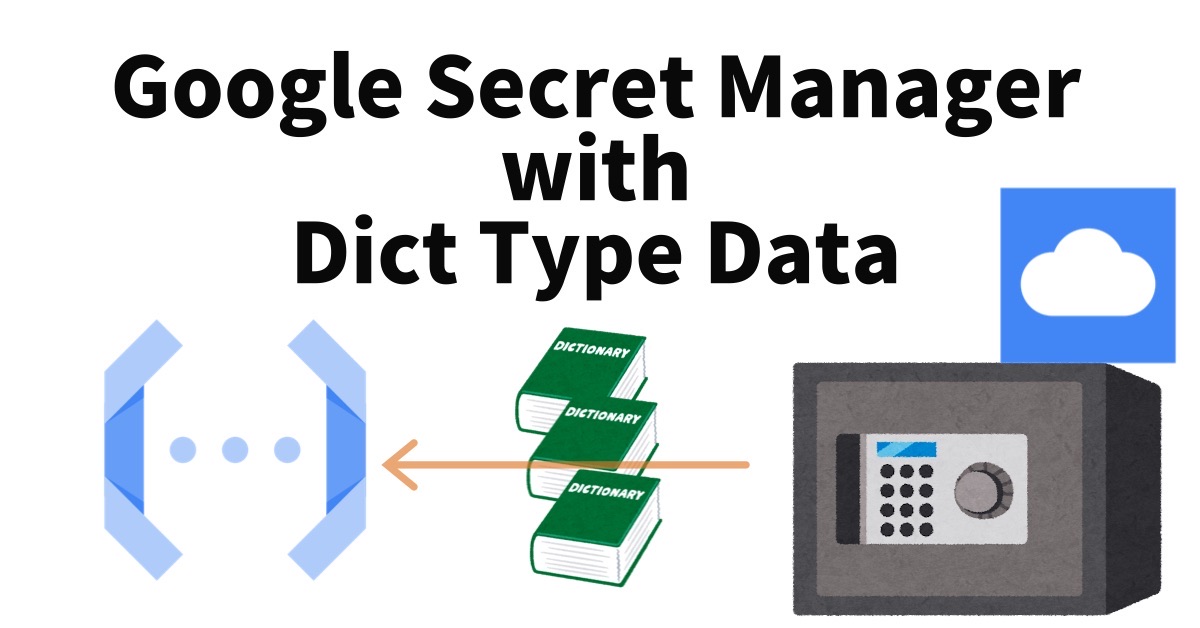こちらの記事 で Google Secret Manager に パスワード や API キー といった 「他者に知られたくない」あるいは 「公開したくない」 情報を格納する方法を紹介しました。 今回はより実践的な管理方法として 辞書型 の データ を Secret に登録して Python で 作成した Cloud Functions 関数 で 意図通り 辞書型 として扱う方法について紹介していきます。
前提
本記事を読みすすめるにあたっては、以下を実施済みであることが前提となっています。
- Python 開発環境の設定
- サービスアカウント作成済み
- Secret Manager API の有効化
- Secret Manager への アクセス ロール 付与済み
これらが未実施の場合は 以下の 関連記事 を参照してください。
Secret の作成
それでは早速 辞書型の データ を Secret Manager に登録していきます。
本記事では 以下のような 構造をもつ Dict 型 の データ を登録してみます。
{
"headers": {
"key": "key value",
"host": "host name"
}
}
以下の リンク を クリック して GCP コンソール から Secret Manager を表示し、「 シークレットを作成 」を クリック します。
シークレット の詳細として 以下を設定します。
- 名前: 任意の名称(ここでは、 my-dict-secret )
- シークレットの値: 上述した 辞書型 の データ
他の項目は デフォルト のままで 「シークレット を作成」 をクリックし、 Secret の作成を完了させます。
Secret 作成後 Secret の値を確認してみます。
特に フォーマット が変換されることもなく、そのままの テキスト データ として格納されています。
Secret Manager に登録した 辞書型 Secret へ Cloud Functions から アクセス
それでは、 作成した 辞書型 の Secret データ に Cloud Functions から アクセス していきます。こちらの記事 で作成した 関数 をベースにします。
Secret に登録した値は純粋な テキストデータ として扱われるため、取得した値を json を用いて 文字列 から 辞書型 に変換することで意図通りの dict 型 として扱うことが可能になります。
def hello_http(request):
import json
response = access_secret_version('sample-for-blog', 'my-dict-secret', 'latest')
payload = response.payload.data.decode("UTF-8")
# convert str to dict
d = json.loads(payload)
print("payload type is ", type(payload), "converted type is ", type(d))
return d
Cloud Functions での テスト
それでは Cloud Functions の テスト 機能を利用して動作を確認していきます。
作成した hello_http は特に引数を必要としないため 「トリガーとなるイベント」は初期値のままとし、 「関数をテストする」をクリックして 出力とログを確認してみます。
出力については 変換後 の 辞書型 を出力するようにしていますが、見た目では分かりませんね。
ログは以下の通りです。 そのままの payload だと str 型となっていることがわかります。
まとめ
- Google Secret Manager に登録したデータは 純粋な テキストデータ として扱われる
- 辞書型データを登録する場合は、値を取得した際に文字列から辞書型に変換する
関連記事
今回使用したサンプルソース
def access_secret_version(project_id, secret_id, version_id):
"""
Access the payload for the given secret version if one exists. The version
can be a version number as a string (e.g. "5") or an alias (e.g. "latest").
"""
# Import the Secret Manager client library.
from google.cloud import secretmanager
# Create the Secret Manager client.
client = secretmanager.SecretManagerServiceClient()
# Build the resource name of the secret version.
name = f"projects/{project_id}/secrets/{secret_id}/versions/{version_id}"
print(name)
# Access the secret version.
response = client.access_secret_version(request={"name": name})
# Print the secret payload.
#
# WARNING: Do not print the secret in a production environment - this
# snippet is showing how to access the secret material.
payload = response.payload.data.decode("UTF-8")
print("Plaintext: {}".format(payload))
return response
def hello_http(request):
import json
response = access_secret_version('sample-for-blog', 'my-dict-secret', 'latest')
payload = response.payload.data.decode("UTF-8")
# convert str to dict
d = json.loads(payload)
print("payload type is ", type(payload), "converted type is ", type(d))
return d

